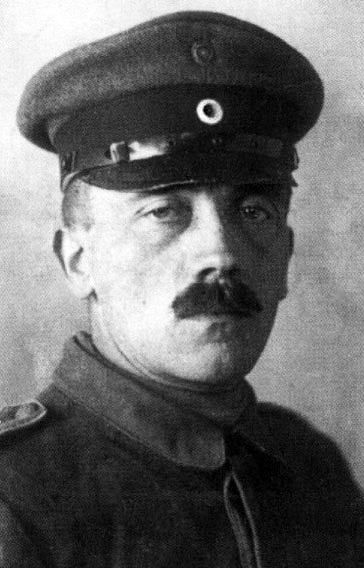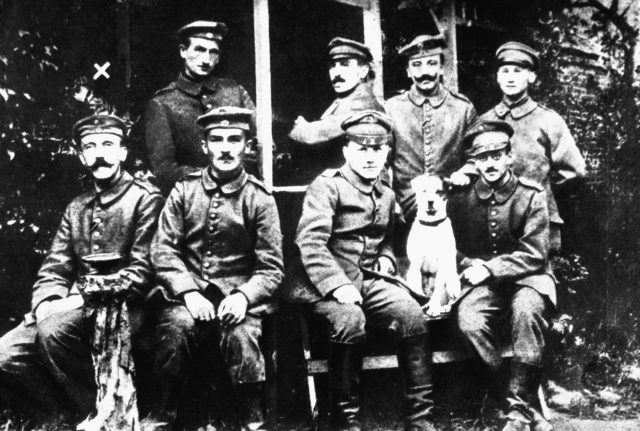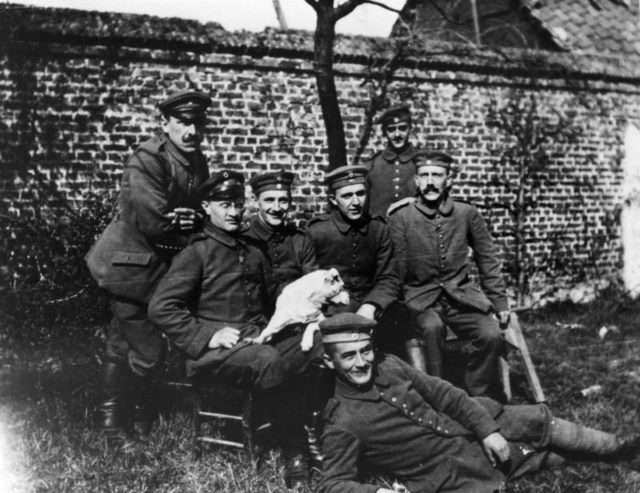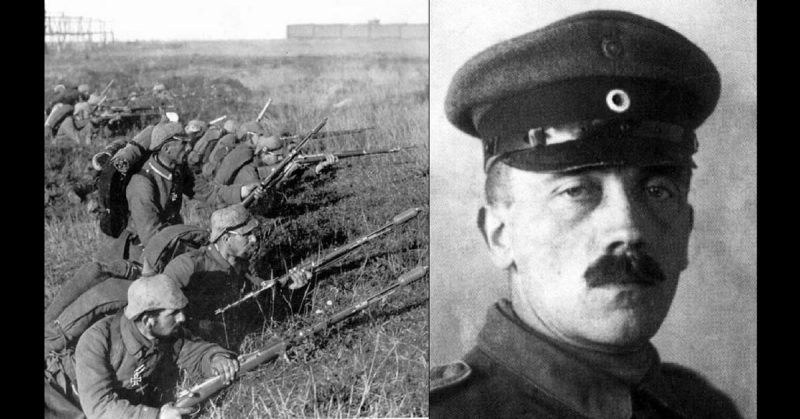Adolf Hitler is remembered for the terrible destruction of WWII. Before that, he served with courage in WWI. That first conflict deeply influenced his future.
Hitler Before the War
Before WWI, Hitler was an unpromising individual. Coming from the Austrian lower middle class, he was constantly frustrated by his inability to rise in society. He saw himself as an intellectual and part of the Austrian Empire’s German elite. Others saw him as a drifter working in odd jobs, who fled to Germany rather than accept military service alongside Czechs, Croats, and Jews, whom he despised.
The Bavarian Reserve
Hitler had dodged the Austrian draft, but he was no coward. When WWI broke out, he volunteered for service in the Bavarian army.
Although part of Germany, Bavaria maintained an independent army. The Austrian Hitler petitioned for the right to join that army. On August 16, 1914, he became part of the 16th Bavarian Reserve Regiment.

The Massacre of the Innocents
Within months, Hitler took part in one of the most traumatic battles the German army experienced.
In October 1914, both sides were stretched thin as they raced to close the gap between their lines and the sea. Reserve regiments including the 16th Bavarian Reserve were rushed from inadequate training to fill the lines around Ypres.
In late October, those reserves were sent into action against the depleted but experienced soldiers of the British Expeditionary Force. The fresh German recruits suffered terrible casualties to no gain. The 16th went into battle with 3,600 men. Within four days, they had only 611 unwounded survivors. By December, Hitler’s company of 250 soldiers was down to 42.
The loss of so many young men deeply unsettled the Germans; they called it the Massacre of the Innocents.
For his part in the fighting, Hitler was promoted to lance-corporal and recommended for the Iron Cross Second Class.

Military and Social Promotion
Becoming part of the Bavarian Reserve was an ideal opportunity for social promotion for Hitler. He was serving alongside students and professionals from good German families. At last, he was among the sort of people he wanted to be with.
He obtained little military promotion during the war. He never became embittered about it, perhaps because of the other opportunities he encountered.
A Diligent Soldier
Everyone who served with Hitler spoke of him as a brave and conscientious soldier. Long before he gained any significant influence in Germany, his former officers wrote about his “reckless courage,” “exemplary bearing,” and “upright and honorable nature.”
In war, he found the best in himself.
The Messenger
Hitler spent much of the war serving as a runner, carrying messages back and forth between the lines. During his rise to power, some people tried to use it as an insult, saying he had not faced the dangers of the front line. Anyone who had seen the runners at work knew better.
Runners did not take part in the trench assaults that saw so many men killed. Neither did they experience the long periods of relative safety between attacks. Instead, they were in action throughout, running back and forth with messages through artillery bombardments, gunfire, and gas.
During the first day of one battle, three out of the eight messengers in Hitler’s battalion were killed and a fourth badly wounded. Theirs was a dangerous job.
Bapaume
Hitler was injured several times during the war. The worst was on October 7, 1916, during heavy fighting near Bapaume. During an advance, Hitler was severely wounded in his left thigh by a fragment of shell. He had to be left behind and was later evacuated by stretcher bearers.
For the next five months, Hitler was laid up in a hospital in Germany. Once he had recovered, he returned to the front.

A Life-Changing Experience
Aside from his convalescence and two periods of home leave, Hitler was on the Western Front for the whole four years from October 1914 to October 1918. Few men had more experience of the war than him.
Despite the injuries and deprivations, Hitler spoke fondly of the war. To him, it was the greatest of all experiences. Being part of something greater, working with people he admired for a common cause, it was a powerful experience for a young man.
To Hitler, the lesson of WWI was not one of devastating waste. It was a heroic war fought with comrades, and meaningful in a way his civilian life had never been.
The Later War
In the fall of 1917, Hitler spent a brief period on the quiet lines near Alsace. Other than that, he spent the whole war around Ypres. It was the wettest, muddiest, most fiercely contested sector of the front.
Heavy shelling and trench raids were common. There were repeated heavy offensives. Hitler’s division fought in the battles of Ypres, the Somme, and Arras – battles remembered with horror for their relentless devastation and terrible losses.
By October 1918, two of the three regiments in Hitler’s division had been combined. There were not enough men to fill the gaps left by casualties. They were still fighting near to where they had joined the war around Ypres.
On October 13, Hitler was in the frontline trenches when the British launched a gas attack. The gas seeped unseen into his dugout overnight. At dawn, he headed toward battalion headquarters with a message. Although temporarily blinded by the gas, he refused to be stopped.
An Impressive Record
Hitler’s war record was impressive. In four years of service, he took part in twelve battles and twenty-five other stints of trench duty. He was injured three times and won five distinguished medals.
The war shaped Hitler for the rest of his life. Not because he was embittered at his lowly service. Rather, because the worst horrors that humanity had ever inflicted were associated in his mind with the best days of his life.
Source:
John Keegan (1987), The Mask of Command;
